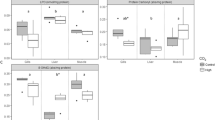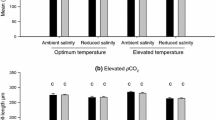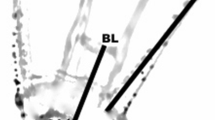Abstract
The ability to understand and predict the effects of ocean warming (under realistic scenarios) on marine biota is of paramount importance, especially at the most vulnerable early life stages. Here we investigated the impact of predicted environmental warming (+3 °C) on the development, metabolism, heat shock response and antioxidant defense mechanisms of the early stages of the common octopus, Octopus vulgaris. As expected, warming shortened embryonic developmental time by 13 days, from 38 days at 18 °C to 25 days at 21 °C. Concomitantly, survival decreased significantly (~29.9 %). Size at hatching varied inversely with temperature, and the percentage of smaller premature paralarvae increased drastically, from 0 % at 18 °C to 17.8 % at 21 °C. The metabolic costs of the transition from an encapsulated embryo to a free planktonic form increased significantly with warming, and HSP70 concentrations and glutathione S-transferase activity levels were significantly magnified from late embryonic to paralarval stages. Yet, despite the presence of effective antioxidant defense mechanisms, ocean warming led to an augmentation of malondialdehyde levels (an indicative of enhanced ROS action), a process considered to be one of the most frequent cellular injury mechanisms. Thus, the present study provides clues about how the magnitude and rate of ocean warming will challenge the buffering capacities of octopus embryos and hatchlings’ physiology. The prediction and understanding of the biochemical and physiological responses to warmer temperatures (under realistic scenarios) is crucial for the management of highly commercial and ecologically important species, such as O. vulgaris.





Similar content being viewed by others
References
Agarraberes FA, Dice JF (2001) Protein translocation across membranes. Biochim Biophys Acta 1513:1–24
Anestis A, Lazou A, Pörtner HO, Michaelidis B (2007) Behavioural, metabolic and molecular stress responses of the marine bivalve Mytilus galloprovincialis during long-term acclimation at increasing ambient temperature. Am J Physiol Reg Integr Comp Physiol 293:R911–R921
Atkinson D, Sibly RM (1997) Why are organisms usually bigger in colder environments? Making sense of a life history puzzle. Trend Ecol Evol 12:235–239
Bartol IK, Krueger PS, Stewart WJ, Thompson JT (2009) Pulsed jet dynamics of squid hatchlings at intermediate Reynolds numbers. J Exp Biol 212:1506–1518
Boletzky SV (1974) Elevage de Céphalopodes en aquarium. Vie Milieu 24:309–340
Boletzky SV (1987) Embryonic phase. In: Boyle PR (ed) Cephalopod life cycles. Academic Press, London, pp 5–31
Bouchaud O (1991) Energy consumption of the cuttlefish Sepia officinalis (mollusca: cephalopoda) during embryonic development, preliminary results. Bull Mar Sci 49:333–340
Boyle P, Rodhouse PG (2005) Cephalopods. Ecology and fisheries. Blackwell Publishing, Oxford
Buckley BA, Gracey AY, Somero GN (2006) The cellular response to heat stress in the goby Gillichthys mirabilis: a cDNA microarray and protein-level analysis. J Exp Biol 209:2660–2677
Byrne M (2011) Impact of ocean warming and ocean acidification on marine invertebrate life history stages: vulnerabilities and potential for persistence in a changing ocean. Ocean Mar Biol Ann Rev 49:1–42
Calado R, Vitorino A, Dionísio G, Dinis MT (2007) A recirculated maturation system for marine ornamental decapods. Aquaculture 263:68–74
Cinti A, Barón PJ, Rivas AL (2004) The effects of environmental factors on the embryonic survival of the Patagonian squid Loligo gahi. J Exp Mar Biol Ecol 313:225–240
Cronin ER, Seymour RS (2000) Respiration of the eggs of the giant cuttlefish Sepia apama. Mar Biol 136:863–870
Fink AL (1999) Chaperone-mediated protein folding. Phys Rev 79:425–449
Forsythe JW (1993) A working hypothesis of how seasonal temperature change may impact the field growth of young cephalopods. In: Okutami T, O’Dor RK, Kubodera T (eds) Recent advances in cephalopod fisheries biology. Japan Tokai University Press, Tokyo, pp 133–143
Forsythe JW, Van Heukelem WF (1987) Growth. In: PR B (ed) Cephalopod life cycles, vol II: comparative reviews. UK Academic Press, London, pp 135–156
Frydman J (2001) Folding of newly translated proteins in vivo: the role of molecular chaperones. Annu Rev Biochem 70:603–647
Garrido C, Gurbuxani S, Ravagnan L, Kroemer G (2001) Heat shock proteins: endogenous modulators of apoptotic cell death. Biochem Biophys Res Comm 286:433–442
Gething MJ (1997) Guidebook to molecular chaperones and protein-folding catalysts. Oxford University Press, New York
Gutowska MA, Melzner F (2009) Abiotic conditions in cephalopod (Sepia officinalis) eggs: embryonic development at low pH and high pCO2. Mar Biol 156:515–519
Habig WH, Pabst MJ, Jakoby WB (1974) Glutathione S-transferases. The first enzymatic step in mercapturic acid formation. J Biol Chem 249:7130–7139
Halliwell B, Gutteridge JMC (1989) Free radicals in biology and medicine. Clarendon Press, Oxford
Hartl FU (1996) Molecular proteins in cellular protein folding. Nature 381:571–580
Hofmann GE, Somero GN (1996) Protein ubiquitination and stress protein synthesis in Mytilus trossulus occurs during recovery from tidal emersion. Mol Mar Biol Biotech 5:175–184
Kamler E (2008) Resource allocation in yolk-feeding fish. Rev Fish Biol Fisheries 18:143–200
Kurihara H (2008) Effects of CO2-driven ocean acidification on the early development stages of invertebrates. Mar Ecol-Prog Ser 373:275–284
Lesser MP (2006) Oxidative stress in marine environments: biochemistry and physiological ecology. Annu Rev Physiol 68:253–278
Mangold K, Boletsky SV (1973) New data on reproductive biology and growth of Octopus vulgaris. Mar Biol 19:7–12
McMahon JJ, Summers WC (1971) Temperature effects on the developmental rate of squid (Loligo pealei) embryos. Biol Bull 141:561–567
Melzner F, Bock C, Pörtner HO (2006) Temperature-dependent oxygen extraction from the ventilatory current and the costs of ventilation in the cephalopod Sepia officinalis. J Comp Physiol B 176:607–621
Moreno A, dos Santos A, Piatkowski U, Santos AMP, Cabral H (2009) Distribution of cephalopod paralarvae in relation to the regional oceanography of the western Iberia. J Plankton Res 31:73–91
Naef A (1928) Fauna and Flora of the Bay of Napoles: Cephalopoda embryology. Part I vol II Monographia. Zoological Station, Napoles
Njemini R, Demanet C, Mets T (2005) Comparison of two ELISAs for the determination of Hsp70 in serum. J Immunol Method 306:176–182
O’Dor RK (1998) Can understanding squid life-history strategies and recruitment improve management? S Afr J Mar Sci 20:193–206
Oliveira UO, Araújo ASR, Belló-Klein A, da Silva RSM, Kucharski LC (2005) Effects of environmental anoxia and different periods of reoxygenation on oxidative balance in gills of the estuarine crab Chasmagnathus granulata. Comp Biochem Physiol B 140:51–57
Oosthuizen A, Roberts MJ, Sauer WHH (2002) Temperature effects on the embryonic development and hatching of the squid, Loligo vulgaris reynaudii. Bull Mar Sci 71:619–632
Osovitz CJ, Hofmann GE (2005) Thermal history-dependent expression of the hsp70 gene in purple sea urchins: biogeographic patterns and the effect of temperature acclimation. J Exp Mar Biol Ecol 327:134–143
Parra G, Villanueva R, Yúfera M (2000) Respiration rates in late eggs and early hatchlings of common octopus, Octopus vulgaris. J Mar Biol Ass UK 80:557–558
Pimentel MS, Trübenbach K, Faleiro F, Boavida-Portugal J, Repolho T, Rosa R (2012) Impact of ocean warming on the early ontogeny of cephalopods: a metabolic approach. Mar Biol 159:2051–2059
Pörtner HO (2002) Climate change and temperature dependent biogeography: systemic to molecular hierarchies of thermal tolerance in animals. Comp Biochem Physiol A 132:739–761
Pörtner HO, Farrell AP (2008) Physiology and climate change. Science 322:690–691
Prosser CL, Heath JE (1994) Environment and metabolic animal physiology. Wiley-Liss, New York
Relvas P, Barton ED, Dubert J, Oliveira PB, Peliz A, da Silva JCB, Santos AMP (2007) Physical oceanography of the western Iberia ecosystem: latest views and challenges. Prog Oceanogr 74:149–173
Roberts M, Sauer WHH (1994) Environment: the key to understanding the South African chokka squid (Loligo vulgaris reynaudii) life cycle and fishery? Antarct Sci 6:249–258
Rodhouse PG, Nigmatullin CM (1996) Role as consumers. Philos Roy Soc B 351:1003–1022
Rosa R, Seibel BA (2008) Synergistic effects of climate-related variables suggest future physiological impairment in a top oceanic predator. Proc Nat Acad Sci USA 105:20776–20780
Rosa R, Gonzalez L, Dierssen HM, Seibel BA (2012a) Environmental determinants of latitudinal-size trends in cephalopod mollusks. Mar Ecol Prog Ser 464:153–165
Rosa R, Pimentel M, Boavida-Portugal J, Teixeira T, Trübenbach K, Diniz MS (2012b) Ocean warming enhances malformations, premature hatching, metabolic suppression and oxidative stress in the early life stages of a keystone invertebrate. PLoS ONE 7:e38282
Rosa R, Graham P, O′Dor R (2013a) Advances in squid biology, ecology and fisheries, vol I. Myopsid squids. Nova Publishers, New York, in press
Rosa R, Graham P, O′Dor R (2013b) Advances in squid biology, ecology and fisheries, vol II. Oegopsid squids. Nova Publishers, New York, in press
Rosa R, Trübenbach K, Repolho T, Pimentel M, Faleiro F, Boavida-Portugal J, Baptista M, Dionísio G, Leal M, Calado R, Pörtner HO (2013c) Lower hypoxia thresholds of cuttlefish life stages living in a warm acidified ocean. Proc R Soc B 280:20131695
Sakurai Y, Bower JR, Nakamura Y, Yamamoto S, Watanabe K (1996) Effect of temperature on development and survival of Todarodes pacificus embryos and paralarvae. Am Malacol Bull 13:89–95
Santos MB, Clarke MR, Pierce GJ (2001) Assessing the importance of cephalopods in the diets of marine mammals and other top predators: problems and solutions. Fish Res 52:121–139
Seibel BA (2007) On the depth and scale of metabolic rate variation: scaling of oxygen consumption rates and enzymatic activity in the Class Cephalopoda (Mollusca). J Exp Biol 210:1–11
Seibel BA, Rosa R, Trueblood L (2007) Cephalopod metabolism as a function of body size. In: Olson RJ, Young JW (eds) The role of squid in open ocean ecosystems. Global ocean ecosystem dynamics—climate impacts on oceanic top predators. GLOBEC Report 24, pp 9–10
Şen H (2003) Kalamar (Loligo vulgaris Lamarck, 1798) yumurtalarının embriyonik gelişimi ve inkübasyonu. Izmir, Türkiye
Şen H (2004) A preliminary study on the effects of salinity on egg development of European squid (Loligo vulgaris Lamarck, 1798). Israeli J Aquacult Bamidgeh 56:95–101
Şen H (2005) Temperature tolerance of loliginid squid (Loligo vulgaris Lamarck, 1798) eggs in controlled conditions. Turkish J Fish Aquat Sci 5:53–59
Somero GN (2005) Linking biogeography to physiology: evolutionary and acclimatory adjustments of thermal limits. Front Zool 2:1–9
Stadtman ER (1992) Protein oxidation and aging. Science 257:1220–1226
Tucker JWJ (1998) Marine fish culture. Kluwer Academic Publishers, Massachusetts
Turner RL, Lawrence JM (1979) Volume and composition of echinoderm eggs: implications for the use of egg size in life-history models. In: Stancyk SE (ed) Reproductive ecology of marine invertebrates. University of South Carolina Press, Columbia, pp 25–40
Uchiyama M, Mihara M (1978) Determination of malonaldehyde precursor in tissues by thiobarbituric acid test. Anal Biochem 86:271–278
Vecchione M (1991) Observations on the paralarval ecology of a euryhaline squid, Lolliguncula brevis (Cephalopoda: Loliginidae). Fish Bull (US) 89:515–521
Vidal EAG, DiMarco FP, Wormuth JH, Lee PG (2002) Influence of temperature and food availability on survival, growth and yolk utilization in hatchling squid. Bull Mar Sci 71:915–931
Villanueva R (2000) Effect of temperature on statolith grow of the European squid Loligo vulgaris during early life. Mar Biol 136:449–460
Villanueva R, Nozais C, Boletzky SV (1995) The planktonic life of octopuses. Nature 377:107. doi:10.1038/377107a0
Villanueva R, Arkhipkin A, Jereb P, Lefkaditou E, Lipinski MR, Perales-Raya C, Riba J, Rocha F (2003) Embryonic life of the loliginid squid Loligo vulgaris: comparison between statoliths of Atlantic and Mediterranean populations. Mar Ecol Prog Ser 253:197–208
Wachter BD, Wolf G, Richard A, Decleir W (1988) Regulation of respiration during juvenile development of Sepia officinalis (Mollusca: Cephalopoda). Mar Biol 97:365–371
Waluda CM, Rodhouse PG, Trahan PN (2001) Surface oceanography of the inferred hatching grounds of Illex argentinus (Cephalopoda: Ommastrephidae) and influences on recruitment variability. Mar Biol 139:671–679
Wolf G, Verheyen E, Vlaeminck A, Lemaire J, Decleir W (1985) Respiration of Sepia officinalis during embryonic and early juvenile life. Mar Biol 90:35–39
Wood JB, O’Dor RK (2000) Do larger cephalopods live longer? Effects of temperature and phylogeny on interspecific comparisons of age and size at maturity. Mar Biol 136:91–99
Worms J (1983) Loligo vulgaris. In: Boyle PR (ed) Cephalopod life cycles. Academic Press, London, pp 143–157
Zielinski S, Pörtner HO (2000) Oxidative stress and antioxidative defense in cephalopods: a function of metabolic rate or age? Comp Biochem Physiol B 125:147–160
Acknowledgments
The Portuguese Foundation for Science and Technology (FCT) supported this study through project grants PTDC/BIA-BEC/103266/2008 and PTDC/MAR/0908066/2008 to R. Rosa.
Author information
Authors and Affiliations
Corresponding author
Additional information
Communicated by G. Heldmaier.
Electronic supplementary material
Below is the link to the electronic supplementary material.
Rights and permissions
About this article
Cite this article
Repolho, T., Baptista, M., Pimentel, M.S. et al. Developmental and physiological challenges of octopus (Octopus vulgaris) early life stages under ocean warming. J Comp Physiol B 184, 55–64 (2014). https://doi.org/10.1007/s00360-013-0783-y
Received:
Revised:
Accepted:
Published:
Issue Date:
DOI: https://doi.org/10.1007/s00360-013-0783-y




